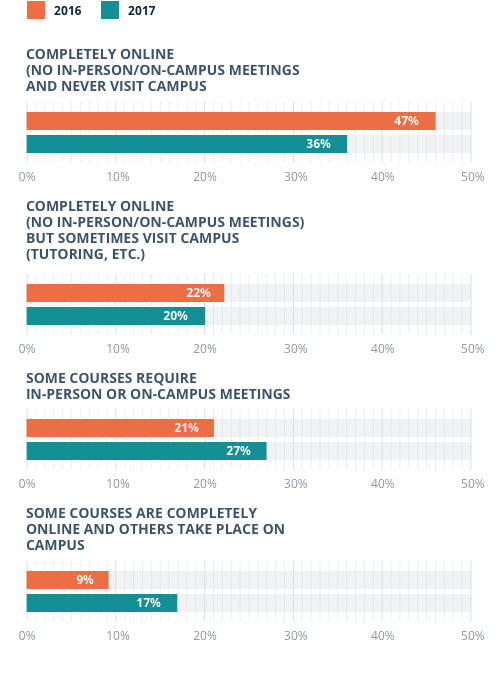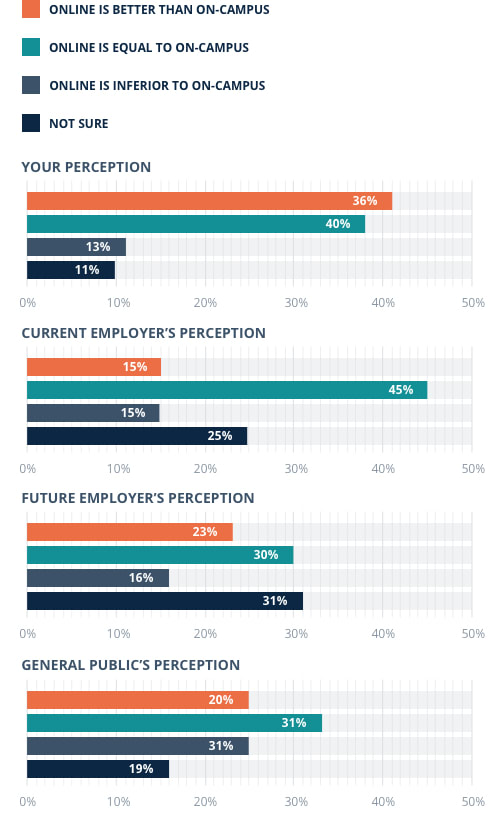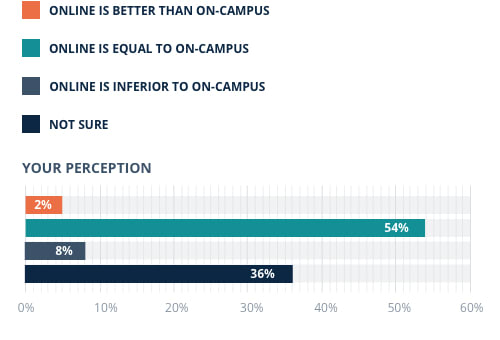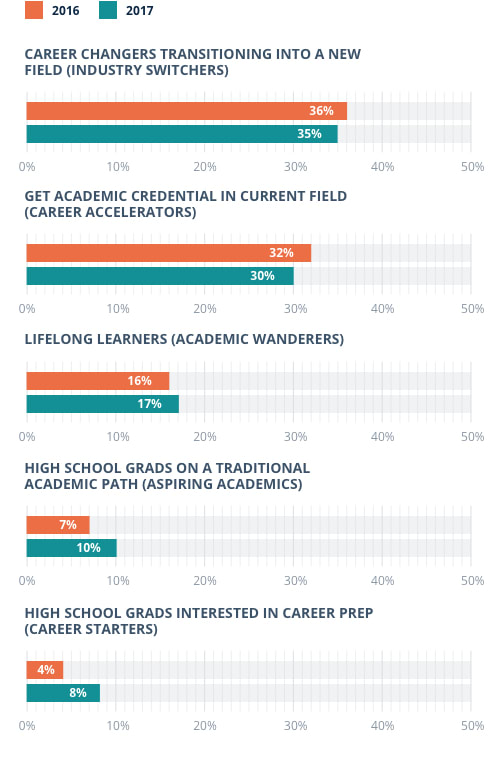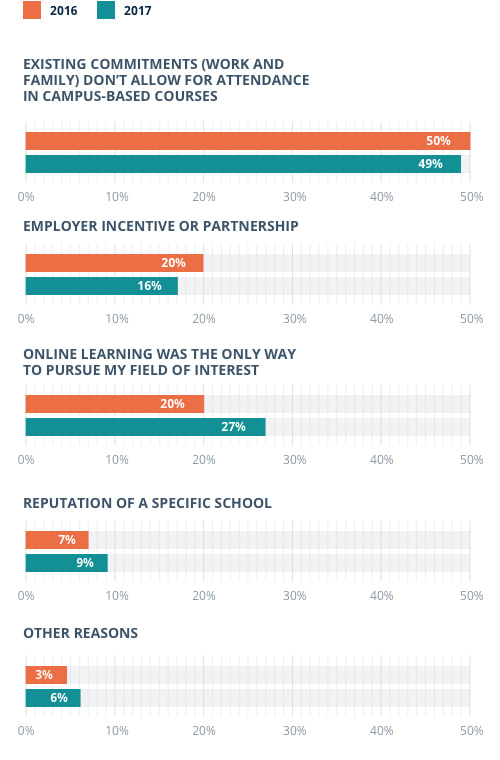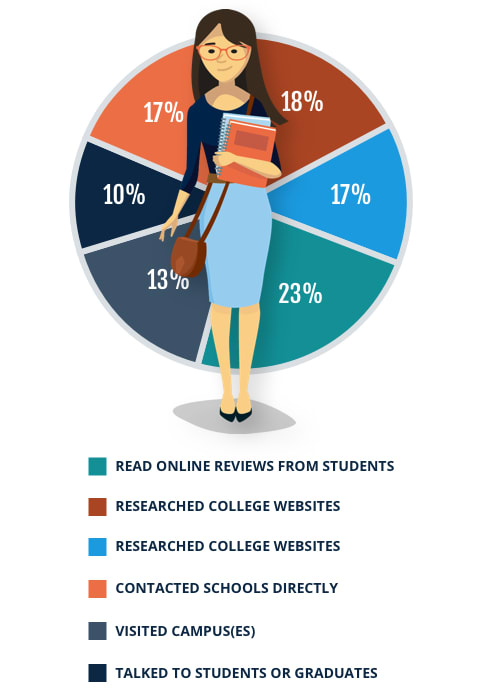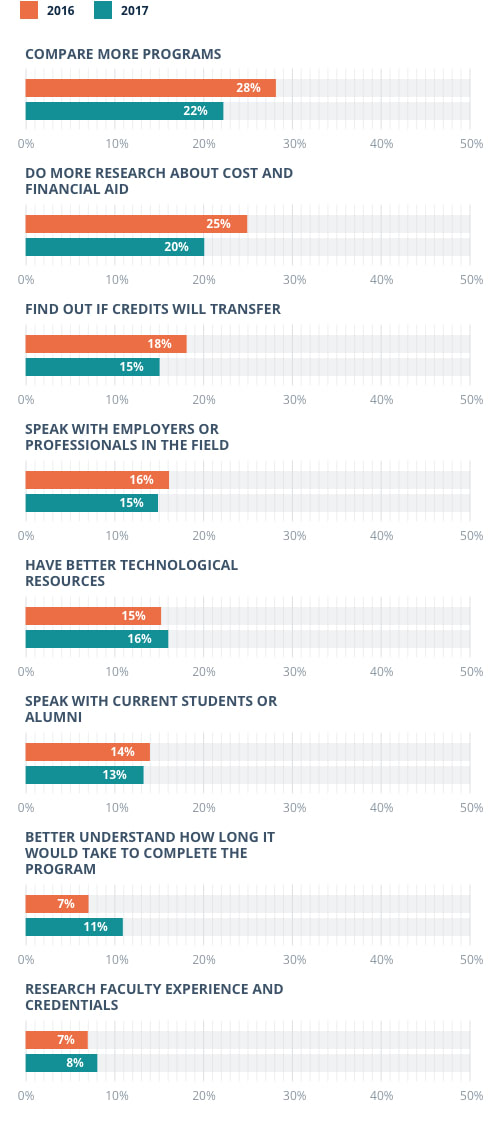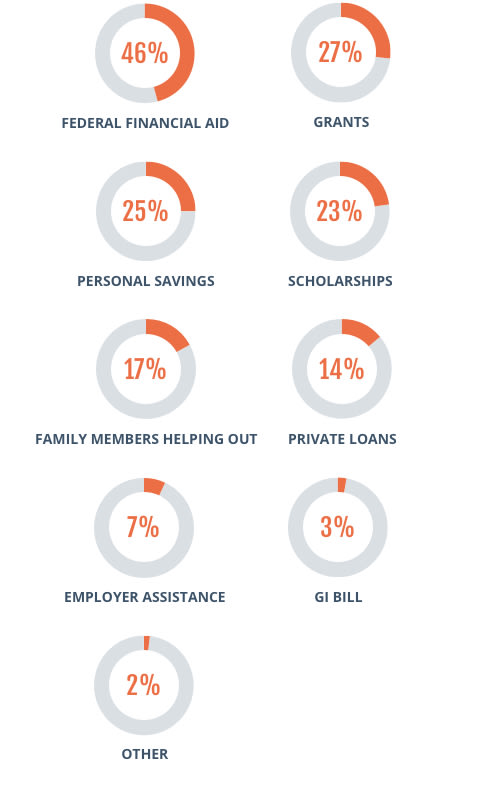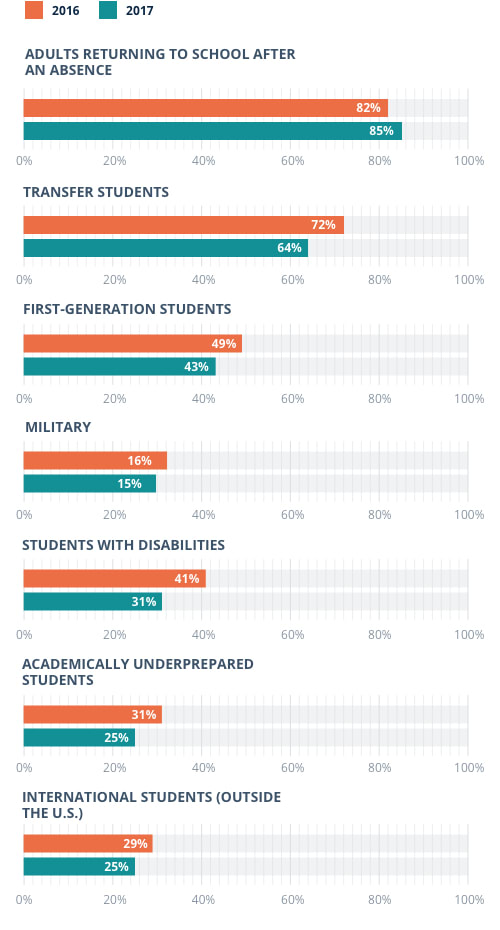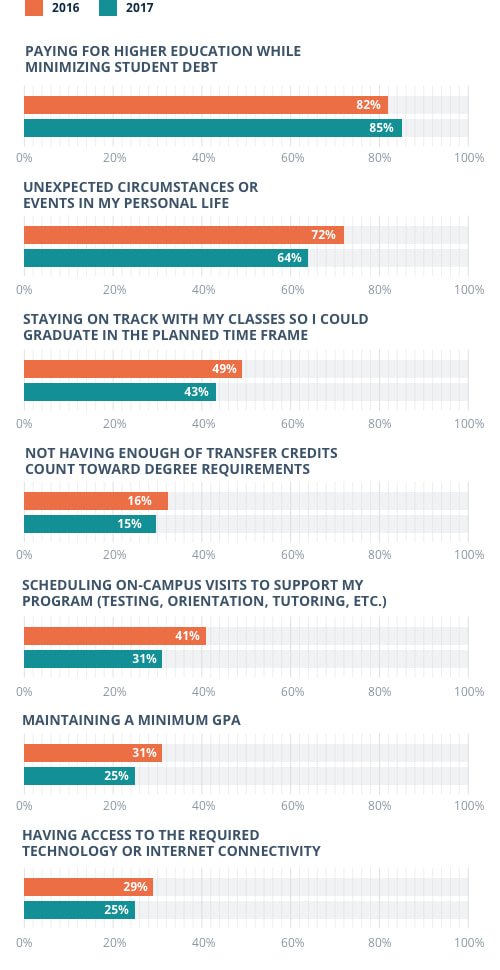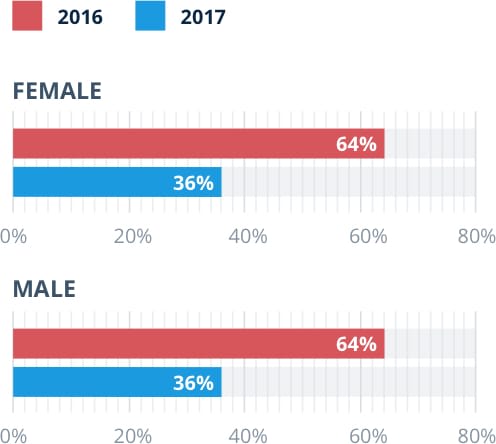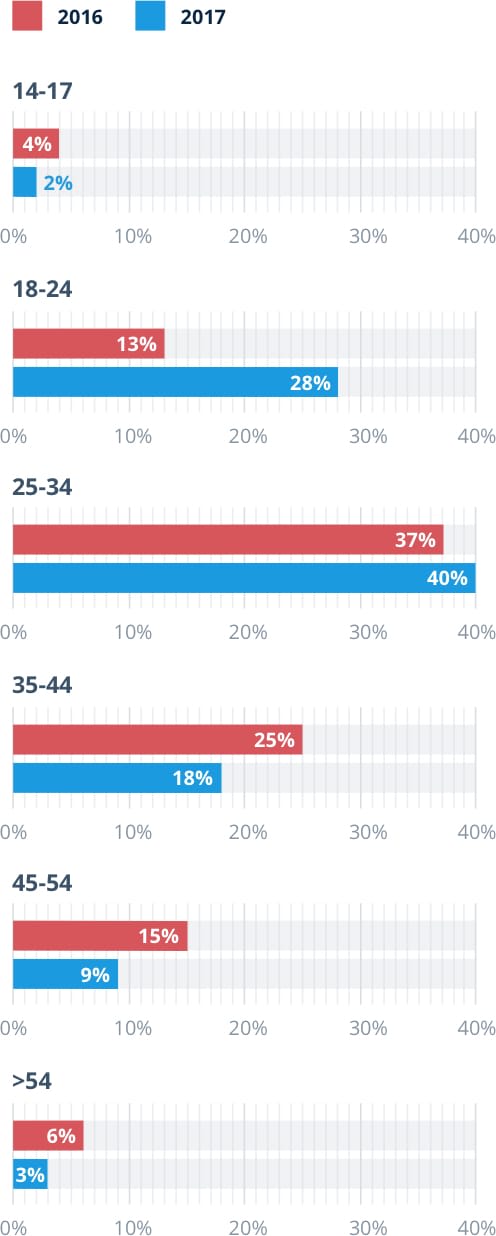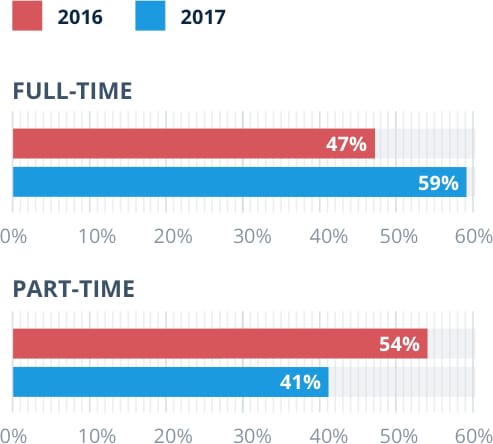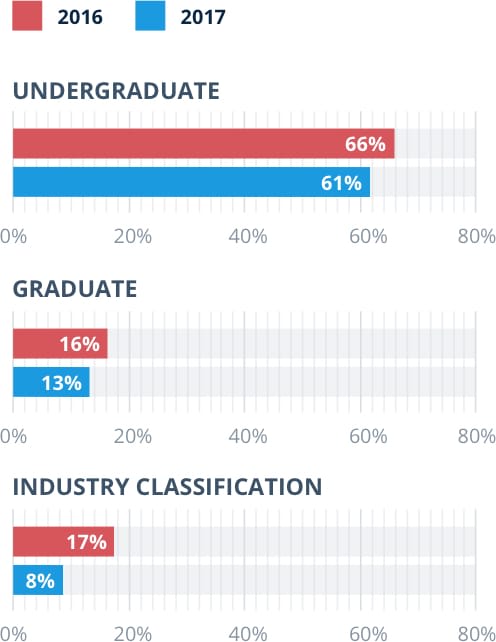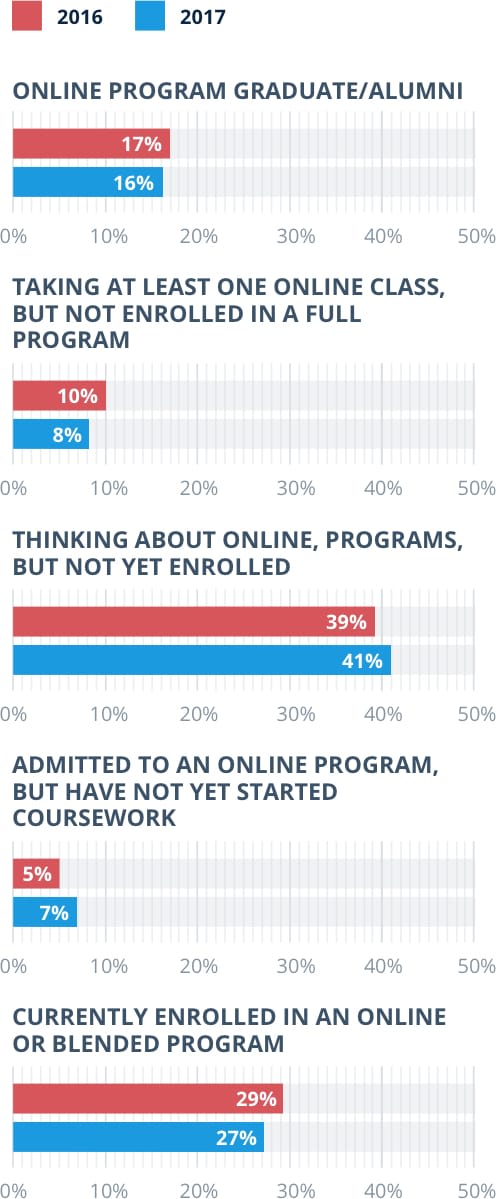2018 Student Guide to Online Education
Welcome to our second annual Student Guide to Online Education! This guide reports the feedback we received from approximately 300 schools and 1,500 students to help you:
- Discover the latest trends in online course technologies, formats, and offerings
- Set realistic expectations based on advice from past online students
- Make your own decisions about online learning
During October and November of 2017, we conducted two surveys. We sent the first to online program administrators at more than 300 colleges and universities. We asked them about the challenges of implementing new programs, as well as their plans for future online programs. The second survey asked 1,500 current, prospective, and past online students about their learning experiences and advice for future students.
Our initiative to collect current feedback and data on trends began in 2017. Our latest guide tracks the trends we’ve found over the past two years, and provides you with the information needed to help you make the best decision possible about online education based on your goals, needs, and preferences for online learning.
2018’s Top Trends
Jody Donovan, the Dean of Students at Colorado State University, says that “taking an online course should be more than sitting in front of a computer — real engagement involves becoming a part of the community of learners.” Donovan’s comment highlights one of the challenges online educators have when teaching a distance course: 53% of the online faculty members who responded to our survey this year identified “developing a learning community at a distance” as their biggest challenge. Adding opportunities to meet in person (i.e., on campus) or in real-time through a video conferencing system can help bridge the gap and foster relationships between students and teachers, as well as among students themselves.
HYBRID/BLENDED LEARNING
The students who responded to our survey reflect the growing number of learners who take classes in mixed formats. Of those who are currently enrolled in a degree or certificate program, almost two-thirds (64%) visit campus either by choice or because their program has an in-person requirement. This represents an increase from 52% last year.
The survey results indicate that the prevalence of hybrid or blended learning options — programs where students take a mixture of on-campus and online courses — is increasing. This year we saw a drop in the number of students reporting that their programs are completely online, and an increase in those reporting some in-person requirements or on-campus courses as part of their academic programs.
REAL-TIME COMMUNICATION
Among students currently enrolled in online or blended courses, half of them said their class requirements were asynchronous (i.e., no live class meetings via chat or virtual classroom software), and half said they have some synchronous component to their courses (i.e., must attend live, scheduled class meetings).
While the numbers have changed slightly over the last year, there’s still evidence that live, scheduled meeting times are common in online courses.
 Take Action
Take Action
Ask about attendance requirements before enrolling in an online program. Consider your flexibility during the evenings and weekends for potential web meetings, and your availability during the week to attend on-campus events or visit on-campus facilities.
 Our BestColleges.com Prediction
Our BestColleges.com Prediction
New technologies, including virtual reality tools, are emerging, and could further enhance live communication and community development at a distance. The New Media Consortium’s latest Horizon Report (2017) indicates the potential for increased use of artificial intelligence in higher education, which will serve as an “incubator for developing more intuitive computers.” Students enrolling in the next five years may use these tools in their online classes.
Perceptions of Online Education
Are you concerned about what others, including potential employers, will think about your online degree? Are you worried about the quality of the education you’ll receive online or what the learning experience will be like? While 23% of our survey respondents expressed some concern about quality, almost one-third had no concerns at all about choosing an online program.
In an effort to develop a broader understanding of how common perceptions of online education are changing, we added several questions for both students and school administrators to the study this year. A majority of students (79%) felt that online learning is either “better than” or “equal to” on-campus learning. They felt their employers (61%), future employers (61%), and the general public (58%) also had a similarly positive perception of online learning.
Our school respondents reported that the majority of employers recruiting and hiring their online graduates see online education as equal to on-campus education.
 Take Action
Take Action
More than a third of schools aren’t sure what their graduates’ employers think about online education. This is a topic worthy of further exploration for schools and prospective students in the future. Ask questions about who is hiring online alumni in the field you are interested in to make better decisions about a specific program.
 Our BestColleges.com Prediction
Our BestColleges.com Prediction
The consensus this year is that the quality of online education is equivalent to on-campus learning, which has not always been the case. In the late 1990s, a study from the University of West Georgia found that students did not believe that online learning was more effective than traditional courses (O’Malley & McCraw, 1999). The Babson Survey Group’s (2016) online learning series tracked academic leaders’ perceptions of online education from 2003, when only 57% thought “online education was as good or better than face-to-face instruction,” to 2015 when the number increased to 71%. We’ll be following this trend again next year to see if attitudes toward online education continue to improve.
Is Online Education Right for You?
It’s important to identify your motivation for studying online. A careful reflection of your individual scheduling needs and academic preferences in an online program would be a good place to start.
IDENTIFY YOUR GOALS
A report from The Parthenon Group identifies six categories of college students, which move beyond the age-based labels of traditional and non-traditional (Ladd, Reynolds, & Selingo, n.d.). Three of these categories focus on career readiness.
College Student Characteristics and Motivations
Students in this category are usually 18-24 years old and focused on academic studies and earning top grades.
Ask Yourself
Are you a recent high school graduate who is motivated by academic success? If so, you may already be thinking about a double major or going on to graduate school.
We used these categories to organize our research, asking current, past, and prospective students to share why they were interested in online learning. This year, 73% said they were motivated by career-related goals, such as changing to a new field or advancing in their current fields. More than one-third (35%) of online students enroll with the goal of transitioning into a new career.
This year, we found a slight increase in the number of respondents reporting that they are traditional high school graduates exploring online education options. This finding coincides with a trend reported by our school respondents: more younger students are enrolling in online programs.
 Our BestColleges.com Prediction
Our BestColleges.com Prediction
Nearly half (49%) of our school administrators observed changes in their online student demographics. Of this group, one of the most notable trends is an increase in younger online students. Research from The Learning House finds a similar trend, as the percentage of 18-24 year old students increased from 24% of online students in 2012 to 44% in 2016 (The Learning House, 2016). We predict this trend will continue with students who enroll while still in high school, and who take advantage of new online learning opportunities through career-oriented, non-degree programs, such as certificates and certifications.
UNDERSTAND YOUR NEEDS AND PREFERENCES
Online education allows students to study remotely. Some programs also allow students to take classes asynchronously, where all coursework is accessible at any time and students can watch lectures at their convenience. These programs are particularly strong fits for students with time-sensitive commitments at work or in their personal lives. Prospective distance learners should also know that they may have access to certain tuition benefits through their employers.
Beyond convenience factors, our survey found additional reasons students choose to study online. Some shared that they find online options are one way to manage social anxieties related to attending courses in person or on campus. Other students shared that transportation issues make attending on-campus classes challenging.
Navigating Your Online Student Journey
Finding a program that meets your needs can seem daunting. Becoming a successful student, and ultimately a successful graduate, takes time, resources, and determination. We asked online students to share the lessons they learned: What would they have done differently? Where were their most significant roadblocks? Were they able to reach their professional goals?
BEFORE YOU ENROLL
There are many ways to research online programs. Students can read the information schools provide about themselves online, speak with counselors and administrators, talk to other online students, visit campus themselves, and browse third party overviews of what various colleges offer. Be sure to take some time to compare your options, and evaluate the best fit for you.
Our survey results include feedback from students about what they did before choosing a program. Many students relied on multiple sources of information; most read online reviews from students and researched college websites.
Students who’ve already graduated from online programs also shared their insight with us about their research. They told us that preliminary research is essential to finding the right school, and that prospective students should seek answers to a range of questions about the online college experience. Respondents recommended that aspiring distance learners should evaluate the holistic costs of the programs under their purview and to diligently apply for financial aid in its various forms.
Most online alumni also wish they had done more research before they started taking classes. They recommend that prospective students spend more time comparing schools, and to evaluate the costs of a program beyond tuition. Their advice for you includes comparing more programs and developing a better understanding of the financial details of being a college student.
 Take Action
Take Action
Some online programs offer a tuition-lock guarantee, where your tuition rate will not increase during your time in school. To see if your prospective schools offer this arrangement, contact school administrators.
Explore Your Financial Resources
Having a strategy in place to cover costs before you enroll is essential. Students answering our survey shared their responses to this question about financing a college education.
Note that while federal financial aid tops the list, many students rely on more than one source for funding, including most frequently personal savings and grants and scholarships.
 Take Action
Take Action
Completing the FAFSA is the first step toward applying many of these resources. Keep in mind that individual institutions also sponsor separate funding opportunities.
Research Support Resources
Many schools plan their new online programs with specific student populations in mind. This kind of planning can lead schools to implement additional support services to assist certain students, such as those serving in the military or people returning to college after an absence to work or raise a family. The schools we surveyed shared a long list of student characteristics they are trying to address in their online programs.
Location is an emerging area of focus for online programs. Some of our school survey respondents shared that their online program decisions are increasingly influenced by the needs of out-of-state students, students who can’t or don’t want to move to attend school, and students in rural or underserved areas.
 Take Action
Take Action
In your research, look for online learning opportunities that are designed for you and those like you. Ask about how the programs are designed and which services and resources have been put in place to help you succeed and graduate.
WHILE YOU ARE A STUDENT
Deciding to become an online student is just the beginning. Once you are accepted and enrolled in your first academic term, there are a few things you can do to make the experience as enjoyable and effective as possible. Our survey revealed practical advice from students who have already graduated from online programs.
Anticipate and Prepare for Challenges
What will it take to graduate? While students generally find themselves academically prepared to succeed, many lack the resources and support needed to fully participate in their courses, for a variety of reasons. Some also struggle to cover costs.
Faculty members and program directors have a different perspective on student obstacles, but they reported similar challenges faced by online students trying to graduate. The top responses were unexpected events in students’ personal lives, and paying for college while minimizing student debt.
 Take Action
Take Action
Succeeding as an online student is a balancing act. Understand the financial commitment involved and connect with advisors from your school to make sure you are on track. They can also help you find resources if your situation changes, such as the loss of a job. Managing your time and competing priorities is also essential.
AFTER YOU GRADUATE
How has or will online education help you reach your goals? Students responding to our survey provided a variety of examples. While many address the ability to study from a location of their own choice (not having to commute to a campus) and at a time that’s convenient (around work and family commitments), others provided examples of how their online programs are helping them move forward academically and professionally.
How Online Education Helps Students Reach Their Goals
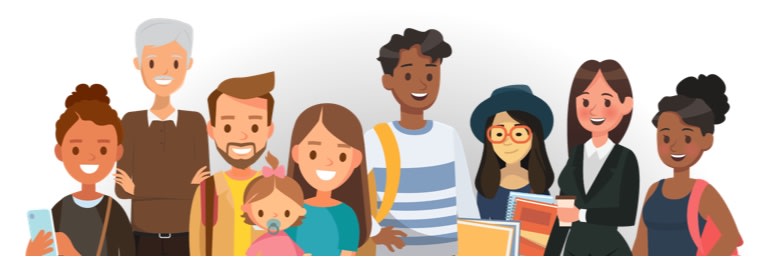
I have been able to stay home with my kids while getting an education.
Made me more independent when it comes to learning new things.
It helped me reach my goal by being flexible. I wasn’t always able to leave work at the same time. So, knowing that I could take online courses in order not to push my graduation date even further was definitely a huge part of reaching my goals.
It has helped me finally come to realize to better my life for my family.
Getting my BSN will allow for better income and less stress. My family will have more disposable income.
Online education will help me reach my goal because I have a certification in that specialty. Companies are always looking for that extra something and having that certification is definitely an extra.
It helped earn the minimum credits needed to sit for the CPA exam.
It will help on higher pay and promotion at my current job.
Helped me to get a promotion.
I’ll be able to start my own business after I receive my degree.
It has helped me earn another degree while still working full time, and at a reduced cost.
Online education developed my motivation and discipline to complete tasks without much supervision.
Is online education a good choice? A majority of online graduates (86%) we surveyed said they recommend it. We also asked if they thought their online degrees have provided or will provide a positive return on their investment, and 82% said “yes.” This is a striking comparison to a 2015 study, which found that 50% of all college graduates thought their education was worth the investment (Gallup News, 2015).
Conclusion
As you select and start a new online program, make the most of the opportunity to pursue your goals by reviewing the action items provided throughout this guide:
- Pay attention to the scheduling component of any program you choose, keeping your availability for live, online class meetings in mind.
- Research preferences and requirements of employers in your field of interest to get a better idea about their perceptions of online learning.
- Compare the features of multiple online programs, particularly costs and support services, to find a match for your needs and interests.
- Find out more about the FAFSA to get started on the process of applying for financial aid, which can include grants and loans.
- Look for academic programs that are tailored to your career and learning needs and goals.
- Keep balance in mind as you pursue an online program, reaching out for support when you need it.
We wish you the best of luck with your online program search!
Appendix
Note: Percentages reported in this document have been rounded, resulting in some totals adding up to just under or over 100. Several charts present results for questions in which survey participants could select more than one response.
Student Survey Demographics
Note: Percentages reported in this document have been rounded, resulting in some totals adding up to just under or over 100. Several charts present results for questions in which survey participants could select more than one response.
References
Babson Survey Research Group. (2016). Online Report Card: Tracking Online Education in the United States.
http://www.onlinelearningsurvey.com/reports/onlinereportcard.pdf
Gallup News. (2015). Gallup-Purdue Index Report 2015.
http://news.gallup.com/reports/197144/5.aspx
Ladd, H., Reynolds, S., & Selingo, J. (n.d.). The Differentiated University: Recognizing the Diverse Needs of Today’s Students. The Parthenon Group.
https://www.luminafoundation.org/files/resources/the-differentiated-university-wp-web-final.pdf
New Media Consortium. (2017). Horizon Report: 2017 Higher Education Edition.
http://cdn.nmc.org/media/2017-nmc-horizon-report-he-EN.pdf
O’Malley & McCraw. (1999). Student Perceptions of Distance Learning, Online Learning and the Traditional Classroom. Journal of Distance Learning Administration, (2)4.
http://www.westga.edu/~distance/omalley24.html
